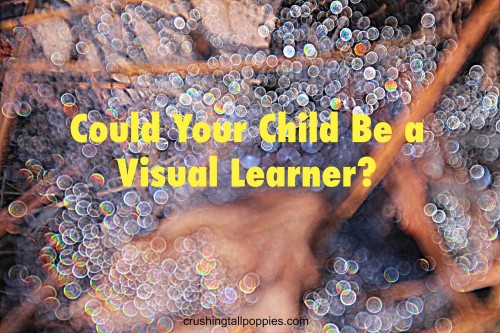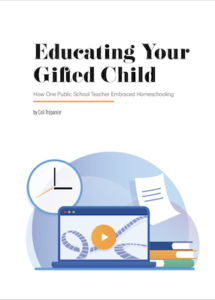Could Your Child Be a Visual Learner?

The following is a guest post by Sheila Gingras. She is the mother of a highly gifted, visual-spatial teenage daughter.
Is your child a whiz at Lego or complex computer and video games? Can they do things with a computer that you never dreamed of at their age? Do they love drawing, painting, drama, dance, or musical theatre? Chances are your child may be a visual spatial learner.
Our daughter is an ‘A’ student. School is very easy for her and she never has to study. But she is not without challenges. School work is not challenging for her. She learns everything the first time she is taught and repetition is not necessary and is frustrating for her. She has been told that the work she has done is so good she could not possibly have done it herself. She has been bullied by teachers and by her peers. By the time she reached grade 6 she had so much anxiety that she had a hard time even going to school. By grade 7 it was clear to us that school was not a safe and nurturing environment for her.
Though getting to the root of the problem wasn’t easy, we finally came to the conclusion that our daughter was a visual spatial learner.
If you are like me, and a lot of teachers out there, you may think that being a visual learner is just the way you prefer to learn, but I have learned that this is not the case and being a visual learner is so much more.
Visuals think in pictures. There are two types of learners, the auditory-sequential learner, who thinks primarily in words, and the visual-spatial learner, who thinks primarily in pictures. You could be one or the other or a combination of both. The school system teaches primarily to the auditory-sequential learner. In order for someone who is a highly visual learner to learn in this type of classroom they need to take the words and change them into pictures to store them in their brain and, when they need to speak or write, they have to take the pictures in their brain and change them into words. This is quite time consuming for the visual learner. When a teacher asks a visual child a question, it takes time for the child to retrieve and translate the picture in their brain to words and it may appear that the child does not know the answer. Or, when a child is giving a speech without cue cards, the words do not come out fast enough.
Auditory learners learn in a step-by-step manner while visuals learn all at once and once they learn it the learning is permanent. I remember a time when my daughter had a test and I reminded her so that she could study. She said she didn’t need to, she knew the work. We talked about it and decided to test it out. She was right, she didn’t need to study. Once she learned the work, it was permanent and there was no need to study.
They need to see the big picture first before learning the details. Once when I was demonstrating a math problem, in a step by step manner, she was getting so frustrated. I found that, by showing her the completed problem, it was much easier for her to understand. It’s like when you buy something that you have to build, like a desk. It is easier to build if you can see a picture of what you are going to build before you build it.
They come up with the correct answer but may not be able to show their work. When doing math problems, she can come up with the answer but she is unable to show the process she used in finding the answer.
They do not learn from repetition and drill. In fact repetition is extremely frustrating for visuals. Because what they learn is permanent there is no need for repetition. They consider it a much better use of their time to learn something new.
Complex tasks may be very easy for them while easy tasks very difficult. This one really puzzled me. My daughter found math so easy but could not do multiplication or division, at least not the way it was taught at school. Part of this is that visuals are not able to learn by memorization/drill.
They have no sense of time. She hated being late for school but nothing I could do could make her any faster. Most of the time, when she was concentrating on something, she seemed to be in another world. She didn’t appear to hear me and the realization that she was late would only hit her when she was away from all distractions.
They are often gifted creatively, technologically, mathematically. There seems to be nothing she can’t do, from puzzles to Lego, complex computer and video games to programming the computer. Math is a breeze and she is a budding scientist. And although she really wants to know how everything works, she doesn’t want to get in trouble, so she has been able to resist taking everything apart.
They are emotionally gifted. She is emotionally mature, more so than her same age peers. She understands relationships that most would not until much later. She is a mediator to others, even her parents, often taking the role of an adult.
They also are very creative, dramatic, artistic and musical. She sings, she dances and she loves acting and musical theatre. She is, and has always been, an amazing artist. Art is something she likes to teach herself. It is like a therapy for her.
Perfectionist. She doesn’t like to think of herself as a perfectionist and I am not sure that she is. She does not like to be wrong though. Part of this is ‘seeing the big picture’ I think. Like when she learned to ride her bike without training wheels. She asked us to take them off when she knew she had it perfected. Then she rode her bike like she’d been riding without training wheels forever. Or when she learned to read, we had no indication that she was trying to learn. We read to her every day and, when the time seemed right, started pointing out the words as we read them. One day she just read an entire book out loud. It was amazing! After that she could read, and pronounce correctly, every single word she read, even in other languages. Visuals observe until they have perfected in their mind how to do something before attempting to do it.
Absent minded professor. You know the kind I mean. The ones who forget to eat and, when they come out of their little world, are starving and you can’t get them food fast enough. The ones you have to lay out their clothes and practically dress them. You are the only one who knows where all their stuff is. And if you don’t keep reminding them they will forget to brush their teeth or do their homework.
Jekyll and Hyde mood swings. Your child is in a bad mood one minute and ecstatically happy the next and you don’t even know why. I still don’t know why. At first I thought it was hormones, and some of it probably is. Part of it is not being able to find a way to handle their anger. They may not have the ability to see the consequences of getting angry. They cannot see another way to handle the situation. They don’t stop and think and organize an alternative plan of action.
A good relationship with the teacher is essential. This was an aha moment for me. My daughter always got on well with her teachers in elementary school and was always an example for others. Her anxiety began when she started middle school and had different teachers for each subject. She was bothered by teachers who threatened, raised their voice or did not show trust and respect for the kids. She experienced a great deal of anxiety, was physically ill with headaches, stomach pain and was unable to concentrate. She was afraid of her teacher. She did not want to go to school. Visuals need to feel personally respected and liked by their teacher or they cannot learn.
Discipline. We learned early on that sending our daughter to her room or getting angry with her was devastating for her. The same discipline used for other children was just not going to work for her. At home and at school, we found what worked best was helping her to understand the reasons and involving her in the solutions. Discipline must be done in private as visuals are very sensitive and easily humiliated. If they are respected, they will learn to treat others with respect.
The visual student at school. School is not well suited to visual learners. Most of the teaching methods are auditory, as are most of the teachers. When your child is fortunate enough to have a visual teacher, both you and your child will feel the magic. Being on time is also important as are deadlines for assignments, a challenge for visuals. And there seems no end to memorization and repetition, an area of frustration. A gifted child can use their giftedness to compensate for their lack of auditory skills for a while but there comes a time where compensating becomes more and more difficult.
Benefits of being visual. Learning the visual spatial way definitely has benefits. It is a much faster and more efficient way of learning, perhaps 5-7 times faster than auditory-sequential learning. It is the way of the future and those who are visual will do very well in that future world. And they are in fine company with famous visual spatial learners; Albert Einstein, Steven Spielberg, Pablo Picasso, Leonardo da Vinci and Frank Lloyd Wright to name a few.
Is being spatial a disability? While you may not have thought about being visual as being a learning disability, until schools start teaching to the visual as well as the auditory, it is a disability to the visual child.
Sheila Gingras and I met virtually through my blog. She had commented on my blog, and through this, we discovered that her daughter and my son were both gifted visual-spatial learners, were both nearly the same age, loved the same activities, suffered through the exact same issues at school, and are now both homeschooled. Sheila impressed me tremendously with her knowledge of gifted visual-spatial learners and now she shares her knowledge with us. Thanks, Sheila!
 Crushing Tall Poppies
Crushing Tall Poppies



I’m definitely not a Visual Learner to THAT high extent described in this blog i DO need a bit of practise (repetition) but honestly not too much usually like after a couple of times but after the whole Concept is demonstrated and explained (They CAN break it up while demonstrating and explaining but i’d prefer they just keep going while i watch, listen and take it in).
Some things that may be a bit more tricky i need to look at it and listen a bit longer, go over it in my head more times and to go over a video again and i honestly prefer videos, still don’t have to practice as much as people who learn differently though. Learning Math as an Adult Learner on Khan Academy it gives you Practise Questions although only 1 or 2 things do i need to go over the Questions again mostly i got it from the video though but you’ve got 4 – 7 questions (mostly 7) we need to get right to get to Proficient slow on the first couple questions but i ace it on the first go after the video prepared me, i still benefit from the Practise Questions to help retain the knowledge, i’m glad it’s only 4 – 7 i’m not fond of the Unit or the Course test being more. Times Tables definitely not my strong suit but i still managed to learn my 6s and 8s just by using the Number Pattern and i’m writing Notes as an an
I defo relate to the Perfectionist bit but it’s not Perfectionism exactly a bit maybe… the rest it’s just this intuition, instinct, way of knowing i’m right even if others don’t think so and don’t get it and there’s a lot of wisdom in that cos I AM 😛 lol it’s not trying too hard to please either i easily feel confidence in those abilities as quickly as i feel put down but i still never stop being confident in what i know i can do cos it works for me.
I can for sure be short tempered but the anger comes from the Frustration and the Anxiety i feel really helpless regularly but it’s learning how to understand and express those concerns that could really help and most importantly understanding what it is to make an informed decision. Good relationships is defo important to me and it does affect me easily if the atmosphere is toxic and you see that a lot these days but if someone can treat me softly, be open minded and understanding i respond SO well to them and i’m happy 🙂 I agree that Visual Learning is a faster way of learning i just love how fast i pick things up (if i’m interested in something) but not sure it would work for everyone.
Hi Emma,
You have such a solid grasp of who you are and how you learn. That puts you way ahead of so many kids your age! Whether you are a total visual-spatial learner or an auditory-sequential learner, knowing how you learn best can help with your lifetime of learning.
I’m always so impressed with your insight into yourself–something that many adults don’t have.
Thank you so much for sharing all of your valuable insights, Emma! <3
No probs i’m always glad to share 🙂 i’m 29 this month but truthfully i really feel like i’m doing a lot of catching up i feel like i should have got to this stage years ago still got some work to do but not sure what difference it would have made at younger development stages, i did try college where they DID notice some things (didn’t know what they meant then though i was around 23 at the time), probs the first thing how young i look and sound you’d swear you were talking to someone quite a lot younger, then not being good at socializing, my struggle with how the odd question is worded and always my terrible handwriting (which i’m not too concerned about never liked writing lol and now we increasingly use computers which i love).
Maybe my mental age goes with the asincrisity thing you always mention i don’t know i only just really learned i’m more of a VL the past few months your blog posts helped from the get go and reading other articles i’m still always learning though 😛 it’s definitely always difficult i need to start writing stuff down more because how situational it is and the slightly different methods i have to use for different things. Most things i’m good with the Strategy you give me but it’s when suddenly out of nowhere i’m not getting certain things that really sticks a wedge in progressing from it that’s always confused ppl in the past, but i learned those things are just what i need to adapt a little bit to how i do and understand things.
Best thing i could say about it and the advice i could give is it’s a lot of trial, error, experimenting and just paying attention in the moment of how you do things, ideas you come up with and how you adapt it before it slips your mind cos it WILL with SO much going on in there, definitely helps to make Notes. Albert Einstein used to apparently be more of a VL too and he wrote lots of short Blurbs and his Notes in a more Compacted format, takes a great deal of organization i guess which i’m still not 100% on lol you’ll lose patience with yourself regularly for sure but you just have to show yourself the patients with yourself others never did.
My youngest son wasn’t that old before I recognized that he gathered knowledge very differently than my older son. For one thing, he was glued to the television whenever it was on. It didn’t even seem to matter what show was playing, he would be watching. I will never forget walking into the living room one day when he was about six months old and seeing him staring up from his walker transfixed by a report Mike Wallace was doing on 60 Minutes. I want to suggest you one of the best preschool for your child. Cambridge Montessori Preschool is the best preschool in delhi
Other than a general description…is there a test of sorts you can do to diagnose a visual/spatial learner?
My daughter fits many of the criteria, but she learns everything so easily, and we pulled her from school young, so we have not seen problems. It would help to know though for the future….
Thanks!
Cheri,
The website with the most information on visual-spatial learners is the Gifted Development Center (http://www.gifteddevelopment.com). As far as a test, when using the WISC-IV test for intelligence/IQ, if a child has high scores on the visual spatial sections of the test, this can suggest your child is strongly visual-spatial. Additionally, if they have lower scores on the verbal and auditory sections along with higher scores in the visual and spatial sections, this is also an indicator of being a visual-spatial learner.